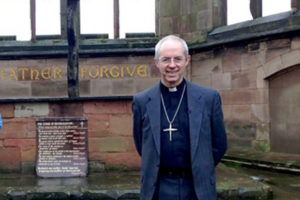Archbishop of Canterbury focuses on reconciliation for New Year Message

The Archbishop of Canterbury, Justin Welby, filmed his 2017 New Year Message in the ruins of the old Coventry Cathedral – destroyed in a Luftwaffe World War II bombing raid on the city involving 515 German bombers on 14 November 1940
[ACNS, by Gavin Drake] The Archbishop of Canterbury, Justin Welby, has focused on reconciliation – one of the three priority areas for his ministry – for his New Year’s Message. The Archbishop filmed the message in Coventry – where he served as cathedral Canon between 2002 and 2007. It was in Coventry that Archbishop Justin developed the cathedral’s international reconciliation ministry, which grew out of the response to the bombing of the former cathedral in World War II during the Coventry Blitz in 1940.
Commenting on the differences caused by reactions to the refugee crisis and the post-Brexit political atmosphere in the UK, Archbishop Justin said: “If we look at our roots, our history and our culture in the Christian tradition; if we reach back into what is best in this country, we will find a path towards reconciling the differences that have divided us.
“If we are welcoming to those in need; if we are generous in giving; if we take hold of our new future with determination and courage – then we will flourish. Living well together despite our differences, offering hospitality to the stranger and those in exile, with unshakable hope for the future – these are the gifts, the commands and the promises of Jesus Christ.”
The message was broadcast on BBC One in England, Wales and Northern Ireland this lunchtime (Sunday).
Recently I stood in the ruins of Coventry Cathedral, which was bombed on November 14 1940. On the remains of the wall behind the altar, are written the words “Father forgive”, echoing the words that Jesus prayed as his enemies crucified him.
The day after the bombing, the Provost of the Cathedral – an extraordinary man called Dick Howard – made a commitment not to revenge, but to seek forgiveness and reconciliation.
On Christmas Day that year, Provost Howard preached a sermon that was broadcast across the Empire on the BBC. In it, he called for a new and more Christ-like world after the war.
I started life as a clergyman here in Coventry. I was ordained in the new Cathedral, which was built alongside the ruins. I never imagined I would work here. But for five years I helped lead Coventry’s global ministry of reconciliation – which grew out of Dick Howard’s vision and now has 200 partners for peace around the world.
Coventry has always been a place that caught my imagination and my passion. The story of this city says so much that is true about Britain at its best – about our courage; our standing up to tyranny; how we stand alongside the suffering and defeated; how we stand for human dignity and hope.
It says something vitally important about our generosity – how we’ve embraced the idea of reconciliation so that our wartime enemies are now friends. Thanks to our creative and innovative spirit, this vibrant and diverse city is also a hugely welcoming place.
I met Sabir Zazai many years ago and I was delighted to have an opportunity to visit the centre for refugees that he now runs. He came as a refugee from Afghanistan in 1999 and his sheer courage and ability are extraordinary. He is now a key figure in the future of this city.
There are people like Sabir all over the country – and they are a blessing to our way of life. They are embracing all that’s good – and that doesn’t just enrich their lives: it enriches and deepens ours too.
Last year we made a decision that will profoundly affect the future of our country – a decision made democratically by the people. The EU Referendum was a tough campaign – and it has left divisions.
But I know that if we look at our roots, our history and our culture in the Christian tradition; if we reach back into what is best in this country, we will find a path towards reconciling the differences that have divided us. If we are welcoming to those in need; if we are generous in giving; if we take hold of our new future with determination and courage – then we will flourish. Living well together despite our differences, offering hospitality to the stranger and those in exile, with unshakable hope for the future – these are the gifts, the commands and the promises of Jesus Christ.
They are also the foundations of our best shared values, traditions and practices in Britain. They make us the country we can be – a gift and source of confidence to this troubled world, in which we live not only for ourselves, but as a beacon of hope, a city set on a hill.
I wish you a happy and hope-filled New Year.